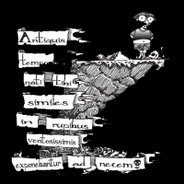"Ye gods," you think, "Is this man never going to return to the subject of writing, which is the thing he does and therefore has a reason to blither about? Shall we forever be getting his opinions on other things, things which lots of people have opinions on."
I may return to writing. I bet I will. But I won't say for sure, because it is the mystery that lingers, and not the suspense.
Today, we talk about....American Idol. AND Writing! HAH!
No, come back, seriously, listen to me for a minute. I'll buy you a drink afterward.
These past couple of years, I've been watching American Idol with something like fanatical obsession, something which I don't admit in public very often and am slightly ashamed of. (Probably the only person more publicly ashamed is He Who Watches American Idol in Women's Clothing.)
The start of this season (yesterday) was hotly anticipated here in the Tzinski household, probably in particular by the male member of the Tzinski family, who is typing this blog entry right now. So we settle in, we wait for the DVR cable box to get up to speed, which took less than an hour tonight! and we watch the Minneapolis auditions.
First, I apologize. Out of 10,000 people, we Minnesotans produced seventeen. The rest were abysmal. In my defense, I'm not from Minnesota and in times like this, I don't claim it. (Although after watching Seattle's auditions, I don't even claim Seattle as part of the United States.)
As I watched in enjoyment and occasional horror, though, the one thought that bubbled up in my mind and wouldn't go away was...My God....those who are getting rejected are just like inexperienced writers!
It was horrifying beyond the bad singing. I refer to a specific sort of young (generally) and inexperienced (sometimes) writer, who may or may not be sane. Usually has not had their recommended dosage of perspective for that day, too.
They're the writers, the equivalent of those Angst-Ridden crying kids who come out of American Idol crying about how MEAN everyone is, how much everyone HATES them, how much no one GETS them. They're writers like that.
There are loads of them. They are the writers that treat rejection letters like personal attacks against themselves, their families, their camels, their fertility, and their generations to come. They are the writers who assume that, just because Bantam Books has not thus far beaten down their door to buy up their freshly finished manuscript before the blood dries, the publishing industry therefore HATES them and wants them never to get published.
The reason the publishing industry doesn't want them to get published is, generally, a deep conspiracy on all levels to insure that this person, this gifted individual and their ART, their ART man, does not reach the people.
Me and Simon Cowell would like to point out that it's not a conspiracy. Here's the thing. Sometimes, you get a rejection letter because you aimed at a target and missed a little. The market doesn't need exactly what you're offering. Maybe it's not bad. It's like being a rocker who goes on American Idol. With scant few exceptions (where we could argue about how well applied the term rocker was) rocker vocals do not work on American Idol. Likewise, perhaps your slipstream romantic comedy story set in space dystopia does not quite match Ellery Queen Mystery Magazine.
Sometimes, both in singing and writing....what it does mean isn't that it's a conspiracy, it means you can't sing. You can't write. Not everyone can do either. I think that everyone can learn to communicate literately in written form, which is not the same thing as telling a story. I'm not saying you should walk away from either one, not if it's your passion. I'm just saying you can expect rejection, and you shouldn't rant and rave against it.
So how do you know if you're good or bad? Well, you don't really. You never fully do. Look how much angst James Joyce managed on an average of writing...whatever it was that he wrote. (James Joyce: As many made up words as Dr. Suess, or your money back!). Some people write for years and years and are never satisfied with what they finish. Likewise, some people can sing magnificantly and are somehow inherently convinced that they're just, you know, okay, they guess.
I guess I tend to use money as a gauge. If someone pays me for something, then either it's pretty good, or they're pretty drunk, and either way the check cashes, so THAT'S all right.
But mostly, what you do is use perspective. This is for singing and writing (a surprising number of people do both; and I mean prose, not lyrics or poetry). Use your head. Assume for a moment that it is entirely possible you are not the big cheese and the camera's not on you, baby! Even if you are the big cheese and the camera is on you, it's important to think that it's not. Humility is not a bad thing, not even a little bit.
Neither are manners. I remember those. I know they exist, 'cause I done got me loads of 'em when I was growing up, and I still use them today. I hold the door open for people, though it may be inconvenient. I'm polite in my capacity as a writer, because at the same time I'm also in my capacity as a human being. If you're a writer, if you're a musician, a singer, you should be polite. Be nice. So little is gained by being brusque and rude with people.
Perspective is the key to all of it, though. It's where you take a step back and say "Okay, wait, hang on....what AM I doing?"
Remember that all these terrifying people on American Idol during the horrifying auditions, fresh from their runs with the circus and now going to perform...all of them laughed at the creepy guests in previous seasons and said "God, I'm glad I'm not like THEM!"
Perspective is where you entertain the possibility that you're exactly like them, and then try your damn hardest to make yourself better. If you're like them, maybe you will make yourself better. If you were already better, maybe you'll learn something a little new. Doesn't hurt either way.
...
Final thought.
Too many of the singers on things like American Idol talk about being a star. I think that's a pretty piss-poor attitude to go in there with. I think it's also a worrying thing with some young writers.
The singers want to be a star! They want to be divas! They want to shine, they're the star, baby, twinkle twinkle, you're like a musical goddess! Omigod! The writers are the next Dan Brown, the next Stephen King, the next J.K. Rowling, no seriously, they are, if you would just buy their stuff, you don't understand, they're literary gods...!
It's the desire to be topp, without putting in the work to GET topp. It's the desire to be the LEGEND of Johnny Lee Hooker, without the bit where you play in the street and rundown gin joints and teach yourself to read.
It's the part where you're Stephen King, bestselling author-god, not the part where you're a young man sitting in a laundry room with a typewriter on your knees, hoping you can finish this book, scared that you're going to be trying to finish this book and telling people "I'm a writer," in fifty years when everything will feel like it's over.
The work is just as important as the result. For writers: When you make your office, make it simple. That's important, and Steve King said so too.
My office right now is the closet, just inside my front door, where you would otherwise have hung up your coats. I have some action figures on a shelf, I have some blue electric lighting rope around a hanger rack. I have two TV dinner tables as my desk, and a folding chair to sit in. I put my iPod next to me wiht headphones, I put the laptop on the TV dinner table, I shut the door, and I write until I run out of air. Then I take a ten minute break.
This is the work. This is the most important part.
Fortunately, you have perspective, so you already knew that.
...
Okay, final plea to the contestants of American Idol: Please. No more angst. Okay? I can't take it. It's like being locked in a room full of hormonal teenagers who are writing sad poems about how much their dads hate them and why only Kurt Cobaine understood them, except for the bit where he died the year before they were born. No more angst. Have a good attitude, be nice, do your best. If you had problems...you had problems. We all had problems.
YOu want to talk about problems, you go into the blues, baby.
Give John Lee Hooker my best, please.








